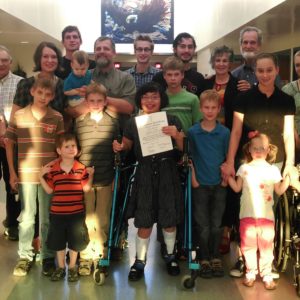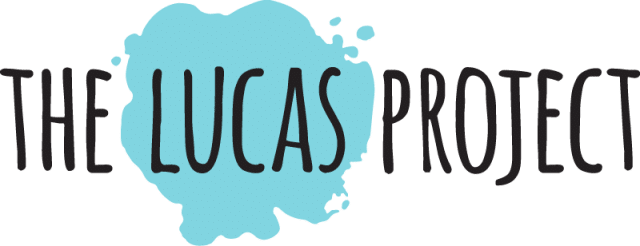
Thank you for your willingness to share your story for The Lucas Project blog! My objective in raising awareness is to shine a spotlight on caretakers and how difficult our role can be. We desperately need support and resources, and the only way we will see change in our communities is by sharing openly and honestly about how lonely, joyful, and exhausting caring for a child with special needs can be.
Let’s start at the beginning. Introduce yourself. Where do you live? What do you do? What does your current family structure look like?
My name is Susanna Musser, and my husband Joe and I have fourteen children, twelve biological and two adopted, four of whom have disabilities. Joe is part owner of the family carpentry business, and I’m a stay-at-home mom in the rolling hills of southern Lancaster County, Pennsylvania. Of our fourteen children, eleven still live at home with us, and we have a live-in mother’s helper who has become part of the family.
When did you first learn that your child would have special needs? Pregnancy? Shortly after? How did you feel? How do you feel now?
We first stepped into the world of disability when an ultrasound during my tenth pregnancy revealed that our unborn daughter, Verity, had a severe heart defect and most likely Down syndrome. It hit me hard, and I grieved hard. As I look back now, almost ten years later, I can see that I was so ignorant about her diagnosis that I was grieving things that never even came to pass–specifically the fear that others would see her as “less than.” Quite to the contrary, in spite of the complicating factor of her additional diagnosis of autism, Verity is loved wherever she goes for her sweet, accepting, and affectionate nature. She and I share a deep and strong bond, and I cannot imagine my life without her in it. Verity needs intense one-to-one instruction in order to learn academics, and currently I am homeschooling her.
When Verity was seventeen months old, we adopted our daughter Katie from a criminally-neglectful orphanage in Bulgaria, where she had been placed when she was a few days old. Katie has Down syndrome as well, but as a result of the profound lifelong neglect she suffered, she has significant intellectual, sensory, attachment, and behavioral challenges. Katie was almost ten years old but weighed a skeletal ten-and-a-half pounds and was wearing a size eighteen months sleeper and a size one diaper when we adopted her. She had severe protein-energy malnutrition, scurvy, severe anemia, severe osteoporosis, and multiple spinal compression fractures due to improper handling of her fragile bones by orphanage staff. She immediately began to thrive once she was receiving good care! She is now a non-verbal seventeen-year-old who is walking, wearing a size 8, learning to feed herself using utensils, and is generally a sweet-natured and contented kid in spite of her severe developmental delay, reactive attachment disorder, and sensory processing difficulties. Katie requires total care, as she is developmentally around eighteen months old, and I include her in Verity’s school day, adapting activities for her or giving her alternative activities.
We adopted our son Tommy about a year and a half after adopting Katie. He was sixteen years old, wearing a size four, and developmentally around five to eleven months old. We lost Tommy to a tragic accident when he had been in our family for only fourteen months.
We adopted again several years later, this time from the dissolution of another family’s international adoption. Josie is sixteen years old and has cerebral palsy with mild-to-moderate physical and intellectual challenges. Josie fit right into our family from her first visit at twelve years old! Her goal is to have a job someday, and she’s challenging herself to stay physically active and to work on her areas of skill deficits in order to reach this goal. She has a good level of independence but does need physical assistance with some gross and fine motor tasks as well as emotional support. She’s doing well in the life skills class in our local school district.
We also have a biological teen son who is gifted and was diagnosed with autism spectrum disorder, attention-deficit hyperactivity disorder, and anxiety just before puberty hit him full force and his anxiety went through the roof. Even with all the needs our three girls have, and even with excellent supports from a local autism center, our son has been our highest-need kid for several years now. He is sweet-natured and gentle with the younger children and is talented with all kinds of repair projects. He is home-schooled along with four of his typical brothers.
I’m a big believer in self-care. What are you incorporating to address this need?
The topic of self-care for full-time caregiver moms is close to my heart since my near-breakdown in the spring of 2018. I had been living with unbearable, unrelenting levels of stress for months when my brain began acting as if it was getting Alzheimers. It was terrifying. We took it seriously on the advice of my therapist and made many drastic changes to life over the next nine months. It didn’t happen overnight, and in fact, life grew more stressful for the first several months, but we persisted. I’m now emotionally and physically in better shape than I have ever been before in my life. I’ve gone from being a weak, easily and chronically exhausted and overwhelmed mom, with recurrent anxiety attacks and sleep difficulties, to being a healthy, energetic, physically and emotionally strong and happy mom who lifts weights, just ran her first half marathon, and hopes to outlive all her kids with disabilities.
Thank you Susanna!
And, if YOU want to help make a difference in the lives of caregivers, please consider a donation – every little bit helps fund a break for these special needs families.
Just keep livin!
